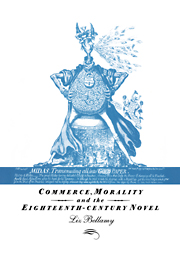4 - The mid-eighteenth-century novel
Published online by Cambridge University Press: 18 December 2009
Summary
Daniel Defoe's Robinson Crusoe can be read as a classic study of individualistic, economic man. Isolated on his island, cut off from the ‘cash nexus’, Crusoe's activities reveal what man is able to achieve through labour, but also the extent to which the lives of Defoe's contemporaries depended on a complex interdependent system. As Crusoe works away at his pots and pans, his table, his bread and so on, he becomes increasingly proud of his small but self-sufficient economy. We are told that ‘it was a great pleasure to me to see all my Goods in such Order, and especially to find my stock of all Necessaries so great’. Yet at the same time the bizarre nature of the figure that Crusoe cuts, in his goatskin cap and floppy shoes, reinforces the distance between this primitive economy and the complex economic system. Crusoe can provide for his wants, but the extreme difficulty of doing so continually leads him to reflect on the advantages of the modern interdependent state:
'tis a little wonderful, and what I believe few People have thought much upon, (viz.) the strange multitude of little Things necessary in the Providing, Producing, Curing, Dressing, Making and Finishing this one Article of Bread.
I that was reduced to a meer State of Nature, found this to my daily Discouragement.
Moreover, Crusoe is not actually in a state of nature.
- Type
- Chapter
- Information
- Commerce, Morality and the Eighteenth-Century Novel , pp. 69 - 118Publisher: Cambridge University PressPrint publication year: 1998



